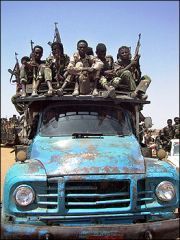Eastern Sudan rebels launch major Red Sea offensive
ASMARA, June 20 (AFP) — Eastern Sudanese rebels have launched a major offensive near the country’s main port, capturing government troops in what Khartoum charged was an operation mounted with the complicity of Eritrea.

|
|
Rebels from Sudan’s Eastern Front parade during a conference held by the Front north of Kassala town, near the Eritrean border on Friday April 1, 2005. (AFP) . |
At least one rebel group from the troubled western Darfur region currently involved in peace talks with Khartoum was involved in the attack, which the local governor charged was an attempt to shift fighting to the east.
Government officials vowed their troops would hit back, prompting fears of a fresh flare-up in Africa’s largest country.
The Eastern Front, a rebel alliance which includes the Beja Congress and the Free Lions movements, said it captured some 20 Sudanese soldiers as its forces advanced on the town of Tokar, south of the Red Sea city of Port Sudan.
“This is our biggest operation in several years; it started Sunday, is continuing today, and we don’t know how long it will last,” said Salah Barqueen, a member of the Asmara-based Eastern Front central committee.
“We have captured 20 prisoners, including one officer, and are now 30 kilometers (18 miles) from Tokar,” he told AFP. Tokar is about 120 kilometers (75 miles) south of Port Sudan, the capital of Red Sea state.
State governor Major General Hatim al-Wasilah al-Sammani confirmed fighting was under way and said one soldier was wounded and four kidnapped in a shelling on a garrison near Tokar.
“The attack occurred about 70 kilometres (45 miles) away from the border and an opposition force cannot go so deep into Sudanese territory without at least having a logistical support that can be provided only by Eritrea.”
Sammani charged that rebel groups who have waged a civil war against the government since February 2003 in Darfur were shifting operations to the east.
“They are planning to shift the rebellion from the west to the east because of ongoing peace talks in Abuja and because, economically, the east is more important to Sudan than the west.”
An Asmara-based leader for the Justice and Equality Movement, one of the two Darfur rebel groups, confirmed his movement was involved in the operation.
“We want a comprehensive solution to the problems of Sudan,” Abdelaziz Osher told AFP. “As long as the government offers a piecemeal solution, even if there an agreement on Darfur, we will continue the struggle somewhere else.”
Rebels both in Darfur and the east claim the government has marginalized their regions.
In April, the newly-formed Eastern Front vowed to carry on the fight against Khartoum at a meeting in rebel-held territory near the Eritrean border.
“It’s not the first time we have had joint missions, because we are fighting the same target: the Khartoum government,” Barqueen said.
Asked if the aim was to take Port Sudan, the country’s main port, Barqueen said only: “Our objectives are many.”
Sammani vowed government troops would hit back, prompting fears of a fresh flare-up in Africa’s largest country.
“This is a military operation with which we have to deal accordingly… We have placed all of our forces on the alert and we shall deal in a manner dictated by the battlefield operations.”
Earlier this month, the Eastern Front said it had captured three Sudanese legislators in eastern Sudan in May and were holding them as “prisoners of war” in what appeared to be their first overt military act against the government since the April meeting.
The Beja Congress first took up arms against Khartoum in 1994 and now controls the region north of the town of Kassala near the Eritrean border. Since 1994, fighting has been sporadic in the region.
Hopes that a January peace deal between Khartoum and southern rebels could snowball were dashed later that month when government forces used deadly force to disperse a riot of Beja supporters in Port Sudan, killing between 14 and 36.
Khartoum pledged to hold talks with the rebels but the offer has yet to materialise.
Barqueen said the current offensive was a direct result of Khartoum’s failure to abide by its promises.
“The Khartoum regime is not genuine, we have had no indication of peace talks to come, so we have started this military plan,” he said.
